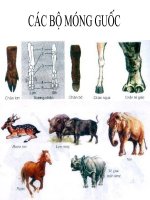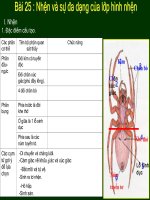Tải Giáo án tiếng Anh lớp 9 Tuần 28 sách mới - Giáo án điện tử môn tiếng Anh 9 theo tuần
Bạn đang xem bản rút gọn của tài liệu. Xem và tải ngay bản đầy đủ của tài liệu tại đây (364.69 KB, 6 trang )
<span class='text_page_counter'>(1)</span><div class='page_container' data-page=1>
<b>GIÁO ÁN TIẾNG ANH LỚP 9 </b>
<b> TUẦN 28</b>
<b>NĂM HỌC 2019 - 2020</b>
<b>Period: 25 </b> <b>Week: 28</b>
<i><b>TEST</b></i>
<b>A 45-MINUTE TEST</b>
<i><b>TEST 1</b></i>
<b>I. OBJECTIVES: By the end of this Unit, students will be able to:</b>
Write complex sentences with different dependent clauses
Use some common phrasal verbs correctly and appropriately
<b>II . PREPARATION: sub -board, pictures, cassette </b>
<b>III. PROCEDURES: </b>
<b>Teacher’s and students’ activities</b> <b>Content</b>
<b>IV- HOMEWORK:</b>
-Write new words then learn them by heart.
-Copy the exercise into notebooks.
-Prepare UNIT 10 ( Getting started )
<b>Period: 26 Week: 28</b>
<b>Unit 10: SPACE TRAVEL</b>
<i><b>Lesson 1 - GETTING STARTED: A mission to Mars</b></i>
<b>I. OBJECTIVES: By the end of this Unit, students will be able to:</b>
Use some vocabularies and structures to talk about space travel
<b>II . PREPARATION: sub -board, pictures, cassette </b>
<b>III. PROCEDURES: </b>
<b>Teacher’s and students’ activities</b> <b>Content</b>
<b>Introduction</b>
Before starting this lesson, do a quick game to revise the
main grammar point in Unit 9: relative pronouns.
Write on the board some phrases that will need relative
clauses to be complete, for example:
<b>a/ </b>
</div>
<span class='text_page_counter'>(2)</span><div class='page_container' data-page=2>
<i>The language...</i>
<i>This is the place...</i>
<i>I met the girl...</i>
In groups of three, Ss take turns to complete these
sentences: the first student says one of these phrases, then
the second student adds a relative pronoun. The last student
will add a clause to finish the sentence.
For example:
<i>Student 1: The language...</i>
<i>Student 2: ...which...</i>
<i>Student 3: ...I would like to learn the most is Spanish.</i>
Before Ss start reading the GETTING STARTED
conversation, introduce the characters Phuc and Nick and
provide the context: Nick is visiting Phuc, and they are now
talking in Phuc’s room.
<i><b>Ask Ss to focus on the picture and the heading ‘A mission</b></i>
<i><b>to Mars’. Ask questions:</b></i>
<i>What do you think Phuc and Nick are talking about?</i>
<i>What else can you see in the room?</i>
<i>What do you think Phuc is interested in? Why do you think</i>
<i>so?</i>
Do not provide corrective feedback at this stage. Now play
the recording. Ask the class to revise their answers if
necessary.
<b>Activity 1: </b>
a/ Now tell Ss to look at the text of the conversation. Play
the recording and have Ss follow along. Have Ss then work
in pairs to do the matching exercise.
b/ Have Ss continue to work in pairs and answer the
questions. Give feedback as a class. Ask Ss to say where in
the conversation they found the answers to the questions.
c/ Have Ss discuss the questions: ‘Who is keener on space
1. d
2. e
3. f
4. c
5. b
6. a
<b>b/ </b>
Key:
1. Phuc was crazy about
space.
2. He had learnt about the
universe and had collected
lots of books about space.
3. To show that there are
more things in the list but that
it’s not necessary to list
everything.
4. He wasn’t very impressed
because he thought the
meteorite was like an ordinary
piece of rock.
5. By scuba diving in a flight
suit and by taking a parabolic
flight to experience
microgravity.
</div>
<span class='text_page_counter'>(3)</span><div class='page_container' data-page=3>
travel – Phuc or Nick? Why do you think so?’
Ask Ss to give as much information in the text to support
their answers as possible.
<b>Activity 2: </b>
Have Ss work individually for this exercise. Ask them to
pay attention to the photos and the key words/ content
words in the sentences. Have Ss then compare their answers
with a partner.
<b>Activity 3: </b>
Ask Ss to work in small groups for this game. Give Ss the
following instructions. T may draw a bingo card on the
board and fill in the first word as a demonstration.
• First, create a Bingo card of nine squares by drawing two
horizontal lines and two vertical lines. Write ‘Bingo!’ in the
middle square to form a ‘free space’.
• Second, create a vocabulary list that contains eight new
words that Ss have learnt in this lesson.
• Third, each player fills in his or her Bingo card with the
words from the list. Each player should have his or her
words in different squares for the game to work.
• Write the eight vocabulary words on small pieces of
paper, shuffle the paper, and keep them face down.
Then, one person turns over the pieces of paper one by one,
and calls out either the actual words or the definitions. (See
the illustration beside.)
• Players find the words in their grid as they are called, and
mark them off. When a player has marked three boxes
down, across, or diagonally (counting the ‘free space’), he
a rollercoaster.
<b>c/ Key:</b>
Phuc seems keener on space
travel than Nick. He was
crazy about space when he
was young. Phuc knows more
about space and astronauts.
He says he’d love to
experience microgravity,
whereas Nick thinks
microgravity sounds scary.
<b>Activity 2: </b>
Key:
1. satellite
2. telescope
3. universe
4. meteorite
5. rocket
6. spacecraft
</div>
<span class='text_page_counter'>(4)</span><div class='page_container' data-page=4>
or she calls out ‘Bingo!’ and wins the round. Ss can play
several rounds with the same card. Use a different symbol
to mark the card for each round.
<b>IV- HOMEWORK:</b>
-Practice reading the dialogue.
-Write new words then learn them by heart.
-Copy the exercise into notebooks.
-Prepare A CLOSER LOOK 1
<b>Period: 27 Week: 28</b>
<b>Unit 10: SPACE TRAVEL</b>
<i><b>Lesson 2 – A CLOSER LOOK 1</b></i>
<b>I. OBJECTIVES: By the end of this Unit, students will be able to:</b>
use the lexical items related to astronomy and space travel
identify continuing or finishing tones and say sentences with the correct
intonation
<b>II . PREPARATION: sub -board, pictures, cassette </b>
<b>III. PROCEDURES: </b>
<b>Teacher’s and students’ activities</b> <b>Content</b>
<b>Vocabulary</b>
<b>Activity 1: </b>
Have Ss work individually to complete the exercise.
Remind them to modify the verbs where necessary.
They then compare their answers in pairs.
For a more able class, after Ss have finished, ask them
which word(s) can be used as a noun as well. Give
feedback: orbit, experience, launch. Ask Ss to make
sentences with these nouns.
<b>Activity 2:</b>
For this exercise, remind Ss of some words about space
they have learnt earlier, for example: astronaut, jet pilot,
weightlessness, water tank laboratory, microgravity.
Then have Ss work individually to complete the exercise.
<b>Activity 1: </b>
Key:
1. orbit
2. experienced
3. launched
4. landed
5. trained
<b>Activity 2:</b>
Key:
</div>
<span class='text_page_counter'>(5)</span><div class='page_container' data-page=5>
Ask Ss to pay attention to the key words to understand
the text, as well as to the part of speech of the missing
words.
<b>Activity 3:</b>
a/ As a class, ask Ss to cover the boxes on the right so
that they can attempt to guess the meaning of the idioms
first. Then they uncover the boxes and do the matching
exercise. Check the answers as a class, and make sure the
idioms are understood before moving on to
b/ Have Ss then work in pairs to make short dialogues
using the idioms they have learnt.
<b>Activity 4:</b>
This game can be played in small groups in two rounds.
In the first round, all groups will read the definitions to
guess the planets. The game will be timed. The group
who is quickest to have all correct answers is the winner.
If time allows, have Ss play the second round. In this
round, T writes the names of some of the planets on the
board (one by one). In 30 seconds, each group has to
write on a piece of paper one fact they know about these
planets, without looking at the textbook. The papers will
then be cross checked by groups to find the group which
has the most correct answers.
<b>Pronunciation</b>
Continuing or finishing tones
Play the recording from GETTING STARTED again,
3. parabolic flights
4. operate
5. spacewalks
<b>Activity 3:</b>
Key:
1. c
2. a
3. d
4. b
<b>Activity 4:</b>
Key:
1. Venus
2. Mercury
3. Jupiter
4. Mars
</div>
<span class='text_page_counter'>(6)</span><div class='page_container' data-page=6>
focusing on the part where Phuc tells Nick about what
he had learnt about space.
<i>‘I’d learnt about the planets, the stars, satellites, rockets,</i>
<i>and stuff.’ </i>
Draw Ss’ attention to the REMEMBER! box.
Give an example of saying a list of things, such as:
<i>-items on the teacher’s desk</i>
<i>-items in your wardrobe at home</i>
<i>-places you have visited</i>
<b>Activity 5:</b>
Ask Ss to work in pairs to practise saying the statements
and short dialogues. Play the recording and have Ss check
their pronunciation.
<b>Activity 6:</b>
Have Ss work in pairs to do the task. If time allows, ask
them to think of other situations when they tell other
people lists of things. Ask Ss to work in pairs to play out
the situations.
<b>IV- HOMEWORK:</b>
-Write new words then learn them by heart.
-Copy the exercise into notebooks.
-Prepare A CLOSER LOOK 2
Mời bạn đọc tham khảo thêm tài liệu Tiếng Anh lớp 9 tại đây:
Bài tập Tiếng Anh lớp 9 theo từng Unit:
Bài tập Tiếng Anh lớp 9 nâng cao:
</div>
<!--links-->









